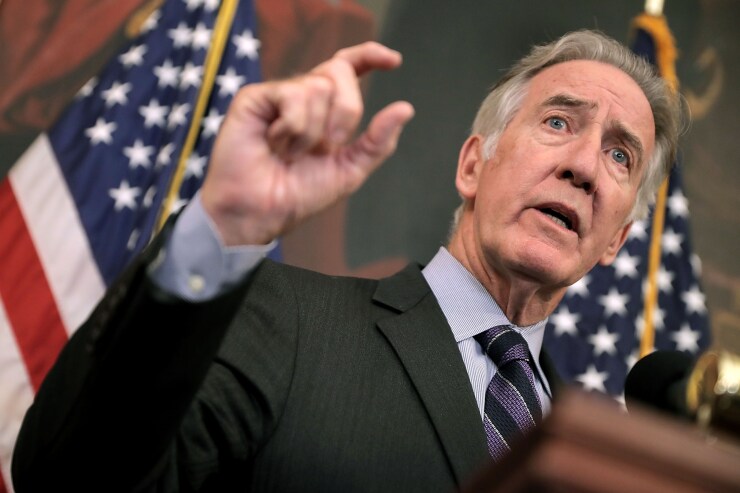The House passed legislation Thursday to help workers at small businesses save for retirement, while also fixing a glitch in the Tax Cuts and Jobs Act that imposed the kiddie tax on Gold Star families and children of deceased service members.
The Setting Every Community Up for Retirement Enhancement (SECURE) Act of 2019 was a bipartisan bill that had previously been passed by the House Ways and Means Committee unanimously. The bipartisan package passed the House on Thursday by an overwhelming margin of 417 to 3, and now moves to the Senate for consideration, where it also has bipartisan support.
The bill would make it easier for local businesses to join together to offer retirement plans for their workers, and give them the flexibility to tailor their retirement plans to best fit the needs of their workers. It also would allow Americans to save longer by removing the age limit for contributing to IRAs, increasing the minimum age for required withdrawals from 70 ½ to 72.
In addition, the bill would encourage younger Americans to save earlier, offering a “new baby savings” provision to allow families to make penalty-free withdrawals from their retirement accounts for the birth or adoption of a child. In addition the bill offers tax certainty to the children of deceased service members.
Despite the high level of bipartisan bickering in Congress, the legislation has a good chance of passing in the Senate and reaching the president’s desk.
“It was a 417-3 bipartisan vote to approve it in the House, so it certainly has a lot of momentum,” said Keith Mong, managing director in Grant Thornton’s Washington National Tax Office. “It really does include a number of provisions that are intended to expand access to essentially tax-favored retirement plans, so there will be a lot of opportunity for accountants and other tax professionals to work with clients to take advantage of some of these new opportunities.”
House Ways and Means Committee chairman Richard Neal, D-Mass., praised the legislation. “With passage of this bill, the House made significant progress in fixing our nation’s retirement crisis and helping workers of all ages save for their futures,” he said in a statement. “The SECURE Act is a bipartisan success, filled with commonsense proposals authored by members from both sides of the aisle. The legislation closes loopholes and makes it easier for small business employees, home care workers, and long-term part-time workers to save for retirement. I’m also proud that we were able to incorporate a much-needed fix to reverse unfair and unexpected high taxes on Gold Star families, low-income scholarship recipients, and children of fallen first responders, among others. I encourage the Senate to follow our lead and swiftly pass this important bill that goes a long way in helping American families prepare for a financially secure retirement.”

The legislation is largely based on the Retirement Enhancement and Savings (RESA) Act of 2019, which Senate Finance Committee chairman Chuck Grassley, R-Iowa, introduced earlier this year with ranking member Ron Wyden, D-Ore.
“The SECURE Act, which passed today in the House of Representatives and includes my Retirement Enhancement and Savings Act, takes an important step forward to help encourage and facilitate retirement savings,” Grassley said in a statement. “It also includes an important fix to eliminate unintended effects of the tax law on children with unearned income, such as Gold Star families and students who earn scholarships and grants. This legislation is an example of bipartisan cooperation to solve issues on behalf of Americans. I appreciate the hard work of my colleagues in the House and look forward to its quick passage in the Senate. Both bills share reform proposals to increase retirement savings in several ways, including improving an existing type of retirement plan called a ‘multiple employer plan,’ or MEP, to make it easier for small employers to join together to sponsor a single retirement plan for their workers.”
The MEP provision could be an important one for accounting firm clients. “A lot of these changes were designed for smaller employers, or employers who for whatever reason didn't feel that they could put a plan in place,” said Mong. “So now they've eliminated some of those barriers or burdens that may have been out there in the past. Just as an example, one of the focuses of this legislation will make it easier to allow for what they call open multiple employer pension plans. In the past there were some restrictions on the ability of unrelated employers who didn't have a common bond in the same industry to get together and establish these plans. They’ve removed some of those barriers now, so it'll be easier for a financial institution or other service providers to offer these types of what they call the open plans. And through those types of plans they can join together and essentially, through economies of scale, reduce the cost of maintaining the plan and also some of the burdens that can shift to the new multiple employer plan providers.”
The bill would also help workers ensure they have adequate income in retirement by creating new rules for employers that offer lifetime-income arrangements in their retirement plans. It would also enhance the ability of employees to transfer their retirement plan assets to a new retirement plan when they change jobs. It would encourage employees to increase their retirement savings annually through automatic increases in contributions to 401(k) plans and requiring employers to provide estimates of how much an employee’s account would provide during retirement if it were invested in an annuity. In addition, it would continue to allow an employee to pass a limited amount of an IRA or 401(k) account to a family member or other beneficiary to permit the beneficiary to continue the tax-deferred saving for retirement.
Among its additions to RESA, the SECURE Act increases the age for taking required minimum distributions from 70½ to 72. It includes proposals to require businesses offering retirement plans to cover certain part-time workers, allow penalty-free withdrawals from retirement accounts to cover birth and adoption expenses, expansion of 529 savings plans to cover apprenticeship programs and certain student loan payments and changes to help certain home health worker increase retirement-plan contributions.
“It's going to open up opportunities to expand coverage of qualified retirement plans in general,” said Mong. “This is probably the largest pension reform legislation in the last 15 or 20 years since the Pension Protection Act. They’ve included a number of bills in it, and it's been floating through Congress in some form or fashion for the last three and a half years.”
The SECURE Act also includes an amendment to address some unintended consequences of reforms to the kiddie tax to ensure middle-class families with children receiving unearned income wouldn’t be subject to tax rates intended to prevent wealthy parents from taking advantage of their child’s lower rate. The amendment would apply broadly, but would particularly benefit families who have children with income from military survivor benefits, Native American tribal payments, Alaska permanent fund dividends and certain scholarships and grants.
The bill would also expand some safe harbors for 401(k) plans. “They've expanded those to make them less burdensome,” said Mong. “For example, in the past there's been an annual notice requirement that required an effort to notify all plan participants of the availability of the plan and that type of stuff. While there are still some rules to provide those types of notifications, it doesn't necessarily have to be done on an annual basis. They've also increased some of the limitations on those. Clearly there are opportunities now for either companies that don't have existing plans or that do to offer the 401(k) safe harbor type.”
Mong sees opportunity for accountants to explain the new opportunities to clients and the limits that might apply.
Ed Zollars of Kaplan Financial Education also sees opportunities for tax professionals. “There’s nothing to do right now but watch the bill’s progress in the Congress,” he wrote in a
Despite the current level of dysfunction in Washington, there is some hope for passage of the bill, particularly after Democrats and Republicans also reached an agreement Thursday on a long-awaited disaster relief bill and President Trump said he would sign it. There could be similar agreement on the SECURE Act.
“There's no question that everything is subject to the political process and you never know what's going to happen,” said Mong. “But at least on a Thursday before Memorial Day, people are feeling good that there's a good chance this is going to get through, and for the most part this has been generally well received by the retirement plan community and the investment community. Certainly you can't please everybody, but for the most part it's been bipartisan and supported by most interested parties.”





